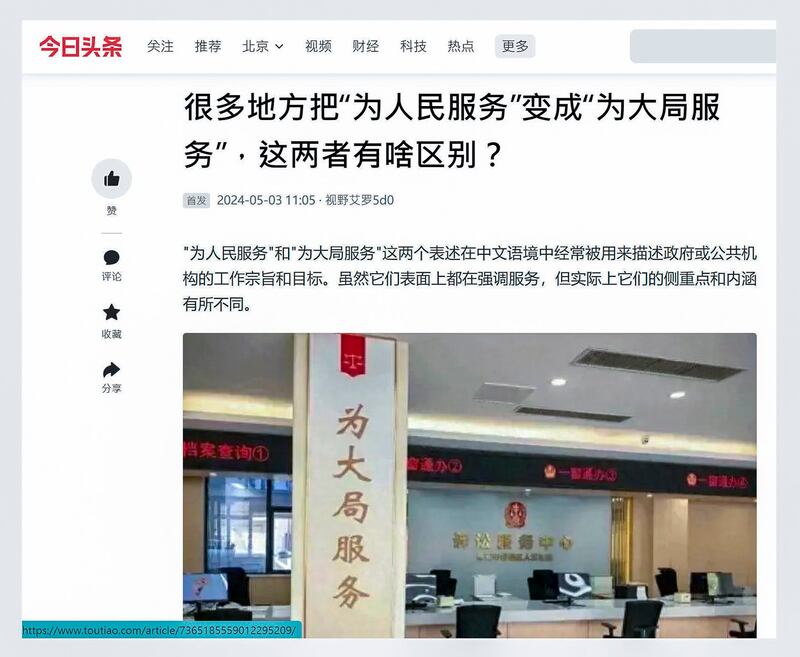Emblazoned in huge gold characters at the gate of the ruling Chinese Communist Party headquarters at Zhongnanhai, the words “to serve the people” has a different meaning in China depending on whom you talk to.
The phrase is often echoed by supporters of late supreme leader Mao Zedong, and often used sarcastically to highlight official wrongdoing by people with grievances. It's now being quietly ditched by the country's top judicial bodies in favor of the much more nebulous "to serve the overall situation."
A May 2 article signed by China’s top prosecutor Ying Yong in the Communist Party’s ideological magazine Qiushi was titled “Serve the overall situation, deliver justice to the people, take responsibility for the rule of law.”
The article came as the Supreme People’s Procuratorate and other judicial bodies also replaced the slogan “Serve the People” on official documents and in public buildings with the words “Serve the Overall Situation,” according to social media posts in recent weeks.
Some comments quipped that the “overall situation” refers to the “boss,” while others played on a character in the word for “situation” that is also in the word for “bureau.”
“What bureau is more important than the people?” one Netease user commented sarcastically on a blog post about the slogan change.
The phrase “To serve the people” comes from a 1944 speech by late supreme leader Mao Zedong, and was intended to describe idealistic Communist Party officials and People’s Liberation Army soldiers who are willing to do anything to bring about a better society, known at the time as the “New China.”

“If we have shortcomings, we don’t fear criticism from others, regardless of who it is pointing it out, because we serve the people,” says the speech.
“The Chinese people are suffering. We have the responsibility to save them, and we must work hard.”
‘Safeguarding the status’ of the Party
The phrase has since become something like a national motto, inscribed, often in Mao’s own calligraphy, in big gold letters or large red characters on official buildings, including the entrance to Zhongnanhai.
It has also been turned around as a form of criticism of government corruption and wrongdoing, particularly by the army of ordinary Chinese who seek redress through official channels as petitioners.
In 2008, a caller to a RFA Mandarin talk show said the tainted baby formula scandal that sickened hundreds of infants showed that "Chinese officials do not serve the people."
In 2009, former People's Liberation Army soldier-turned-whistleblower Zhang Shijun accused the ruling party of hypocrisy for claiming that the army served the people after he wrote about being sent to Beijing in 1989 to enforce martial law during the pro-democracy movement on Tiananmen Square.
More recently, the phrase popped up during three years of strict zero-COVID restrictions that included grueling urban lockdowns, mass quarantine camps and compulsory daily testing regimes, this time to criticize the white-clad "enforcers" who at times welded people into their own apartments in a bid to prevent local outbreaks from the virus.
U.S.-based rights lawyer Wu Shaoping said the judicial agencies and courts once used the slogan “to serve the people” far more frequently, and that the move highlights a shift in attitude at the very top.
“The people have been booted out ... and they have brought in a bunch of evil laws like the Patriotic Education Law, the Counterespionage Law, and national security laws to serve the Chinese Communist Party’s overall interests, calling it the rule of law,” Wu said.
“The people are increasingly losing out, so the overall situation means they are willing to sacrifice lives to ensure their own safety,” he said.
Independent political commentator Chen Daoyin said there wasn’t much difference between the two phrases in practice, because the slogan “to serve the people” is rarely implemented in practice.
“A realistic way of seeing this might be that ... safeguarding national security is the top priority right now, which means safeguarding the status of the Communist Party regime,” Chen said. “That is their fundamental interest.”
‘Anything can be the overall situation’
Feng Chongyi, a professor at the University of Technology in Sydney, agreed, saying that the claim that the ruling party served the people had always been a dubious one.
“To serve the people has always been a lie and a scam,” Feng said. “The overall situation is a very pragmatic idea, because anything can be the overall situation.”
“Under Mao Zedong, it would have meant maintaining Mao’s absolute power, while in the wake of Deng Xiaoping’s suppression of the Tiananmen Square protests, it would have meant the dictatorship of the Communist Party,” he said.
“Today, the overall situation is the one-man dictatorship [of Xi Jinping], which means that the party will destroy whatever it needs to destroy, and strip people of whatever rights they have to maintain it,” Feng said.
The topic has also prompted a number of comments on social media as people tried to figure out what the new phrase actually means.
“Some netizens have quipped that the overall situation ... is that some people have wealth beyond the imagination of most people, but they have to keep it secret,” blogger “Looking at History, Looking at Reality,” wrote on the Netease blogging platform.
“Meanwhile, some people are so poor that they struggle to get enough to eat, but they have to be kept a secret too.”
The blog post quoted another answer as saying: “Some people have amassed a large amount of wealth through various means and methods, and through family relationships, and they need to hide it and even transfer their wealth out of the country, to avoid public resentment.”
“Of course, these are joke answers, but I personally think there’s some truth in it,” the blogger wrote.
Translated with additional reporting by Luisetta Mudie .
